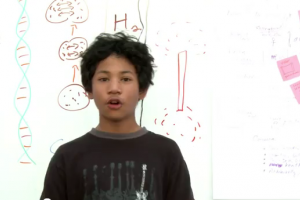Hey, Kids, Meet Open Education

Do open educational resources (OER) matter to young people?
While making a short video recently, entitled "Game Changer: Open Education in Changing the Rules", I posed questions related to Open Educational Resources, or OER, to some Half Moon Bay 6th and 7th graders from Cunha Middle School and 11th and 12th graders from Half Moon Bay High School, public schools located about 25 miles south of San Francisco. I asked these students to take a moment to ponder what they would want to learn if given the opportunity to learn anything they desired, and it turns out that OER -- that is, the potential of free learning -- does carry weight with young learners.
As part of the filming, I asked students: If you could learn anything you wanted to learn, what would it be? And: If learning were free and open to everyone, what would that mean to you? What would it mean to the world?
The video was originally motivated by ISKME's entry in the Department of Education’s competition, Why does Open Education Matter? We decided to “crowdsource” the message by discovering if open education might matter to those not already well initiated in the “open” movement. The questions we posed elicited articulate, inspiring answers, and in addition, they conveyed not only a thirst for learning but also expressed an unsettling sense of deprivation.
Not unexpectedly, none of the students had heard of open education nor had anyone given the idea of open access much thought. When we explained the concept of open education, that is, making educational materials freely available for sharing and customizing, their minds raced in lots of creative directions. Some wanted to get their hands on exciting math problems and science experiments. One student wished she could take on real-world entrepreneurial challenges because she wanted to start a business when she grows up. Another was passionate about uncovering political and historical truths. Each wanted something special, whether it was art, electronics, IT, or gaming. But the bottom line was that they all wanted to make learning relevant to their own culture and their own individual ways of learning. And they all wanted that kind of freedom to be available for everyone in the world.
Perhaps not surprisingly, students portrayed their own school experiences today as limited. Whether due to a “common denominator” approach to teaching that prevents many learners from pursuing their own interests at their own pace, or to the impoverished state of their district and the unlikelihood that new books, technologies or other resources or activities were coming anytime soon, students seemed dubious about getting what they want. Most worrying is their sense, perhaps unconscious, that wanting more is a distrustful pipe dream. Here in a relatively typical suburban town, home to ISKME, which is trying to equalize the education experience through open access and where most kids experience a higher-than average economic lifestyle, young people are internalizing notions around scarcity and inequity in education.
While Americans may take for granted that public education is not adequately funded, have we also noticed another disturbing trend? Are motivated students actually setting their sights low, adjusting their dreams to fit a system that is not serving them adequately? Are we providing enough ways for kids to become the innovators we expect them to be, so we can continue to be a nation of innovators?
As open education, featuring OER, is meant to serve the underserved with high-quality learning, so is it meant to release the creativity of teachers and students, paving the way for anyone to learn and share freely. The overarching hope is that high-quality learning materials are made openly accessible in order to stimulate new collaborative approaches to innovation and to continuous improvement to learning.
From all of us working to promote OER, the message is, Kids, you can innovate and collaborate; the way is open for you around that. We need you. You are all change makers. It’s time to raise your expectations about what education can and should be.
--Amee Evans Godwin is Director, Strategic Initiatives at ISKME (Institute for the Study of Knowledge Management in Education, www.iskme.org), involved in the OER Commons initiative (www.oercommons.org) since 2006. She’s also a documentary and media maker and writer, in the pursuit of collaborative learning for the last two decades.




